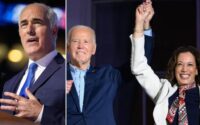Tim Scott rips Trump’s 10% tariff proposal, lays out his ‘Build Don’t Borrow’ economic vision
Sen. Tim Scott’s (R-SC) 2024 economic agenda rollout Thursday featured many typical Republican objectives with one glaring exception: trade.
Nestled in his hodgepodge of GOP wish list items such as tax cuts and regulatory rollbacks in his newly unveiled “Build Don’t Borrow” plan is a call to “avoid blunt trade wars with our friends and allies.”
The proposal pits the Republican presidential contender at odds with the party’s frontrunner former President Donald Trump, who has floated a 10% baseline tariff on goods pouring into the US.
“An across-the-board 10% [tariff would] increase in the cost of everything,” Scott told The Post. “In the current inflationary environment [that] would not be helpful.”
While Scott agrees that the tariffs the US has imposed on China are “helpful,” he is wary about the repercussions of slapping broad-based sanctions on non-adversarial nations.

“I would have to look at every single tariff that we have in place and make sure that they’re achieving the outcome that is necessary,” Scott said. “Targeted tariffs can be helpful. Blank slate and across the board will be harmful.”
Trump had bucked conservative orthodoxy by hewing more protectionist on trade, but Scott believes tariffs should weighed on a case-by-case basis.
Scott’s economic plan boils down to three pillars: slashing government, getting Americans working, and building more in the US.

On taxes, Scott wants to repeal the Estate Tax, bolster tax-advantaged so-called Opportunity Zones, and extend the Tax Cuts and Jobs Act of 2017, which he credits himself for helping to craft.
The TCJA famously lowered the corporate tax rate and featured temporary reductions in the income tax. Last year, the Congressional Budget Office projected that extending those cuts could add $2.7 trillion to the deficit between then and 2032.
Still, Scott is seeking to bill himself as a deficit cutter. His plan calls for a return to pre-pandemic baseline levels for nonmilitary discretionary spending.

Projected deficit reductions from that vary based on specifics and implementation, but a study cited by the conservative CATO Institute suggested a return to pre-pandemic spending levels could save as much as $4.8 trillion over the next decade.
He also wants to gut President Biden’s prized $740 billion Inflation Reduction Act, which Democrats claim curbs the deficit by just under $300 billion over the decade.
For context, the CBO has projected the US will add over $20 trillion to the debt in the 2024–2033 period. At the moment, the current US debt sits just shy of $33 trillion.

“Longterm, we have to have a balanced budget amendment … to tell the leaders in Congress that you can’t spend what you don’t have or buy what you don’t need,” Scott argued.
Other notable proposals in his agenda are a plan to convene a “10th Amendment Commission” of governors to brainstorm ways to reduce government, expand Pell Grants, impose more stringent welfare requirements, champion ethanol, and target Chinese farmland grabs.
“[They’re] buying strategic farmlands as well as other properties in order to spy on what Americans are doing whether it’s on our military bases, and in our agriculture,” Scott warned.
The presidential candidate would deploy power from the Committee on Foreign Investment in the United States (CFIUS), which oversees foreign investments in the US, for the crackdown on China’s land acquisitions.
“Whenever it’s in our national security best interest that we would certainly eliminate them,” he said when asked about banning those purchases.
Scott is currently polling in seventh place with 2.4% support in the 2024 GOP primary, according to the latest RealClearPolitics aggregate.


